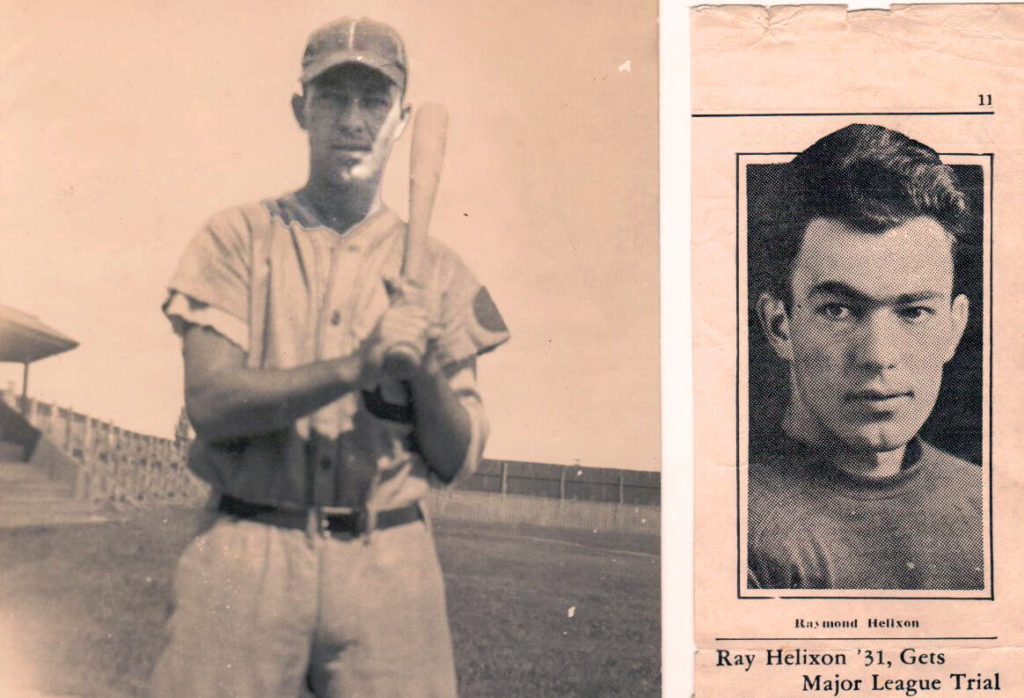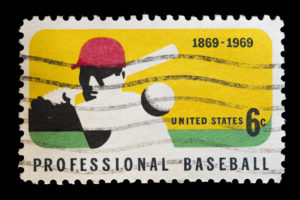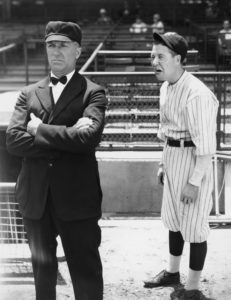Military litigators, including court-martial defense lawyers, can apply lessons from baseball to their practice to become better lawyers and advocates.
[In June, 2014, after nearly eighteen years of active duty in the U.S. Army, I resigned from active duty and entered the U.S. Army Reserves. The SJA at Joint Base Lewis McChord afforded me the opportunity to address the Soldiers as I transitioned to the Reserves, and this blog entry is derived from that speech.]
My grandfather, Raymond, was an imposing man standing well over six feet tall. Even in the waning years of his life, his physical strength was unmatched. A natural athlete, grandpa lettered in football, basketball, baseball and track in college at the University of Wisconsin River Falls (formerly River Falls Teacher’s College) from 1931-34 – his best sport was basketball and he was captain of the team, but it was baseball that he pursued. His dad, my great-grandfather managed a semi-pro baseball team in Marshfield, Wisconsin, winning the league championship in 1934.
As a professional baseball player, Grandpa Ray spent his career in the minor leagues, playing mostly in the Northern League. In 1936 as an outfielder for the St. Louis Cardinal’s minor league team the Jamestown Jimmies, he was an All-Star with 535 at bats, a batting average of .327 with 29 home runs, and a slugging percentage of .548. He was optioned to the Chicago Cubs organization, and soon thereafter suffered a career-ending injury. In 1940, grandpa toured with the House of David baseball team before taking a management job at Johnson Outboard Motors in Waukeagan, IL, and playing semi-pro for a few more years. Baseball was his passion.

When I spent time with Grandpa Ray, ordinary conversation was spiced with baseball references and lingo. He would also use baseball lessons to make points. I remember once after I was upset that my dad would not take us camping for the weekend, grandpa said “it’s okay, there is more than one road trip in the season.” And so it went until his death in 1999.
Borrowing from my grandpa’s teaching method, there a ten lessons from baseball that will serve every military litigator well – regardless of what position you currently play!
Lesson 1. Expect and Learn How to Hit the Curve.
This lesson can be restated that nothing in life is certain, and to expect the unexpected. I was watching TV the other night, and the protagonist said “if you want to make God laugh, announce your plans.” In the military, this applies to assignments and duty positions – you may think you deserved that [fill in the blank] assignment. As a civilian, perhaps that senior officer client should have hired you instead of your top competitor. Maybe you were unfairly characterized in a motion, a news article, or by a superior officer. For me, I joined the Army in 1996 after my civilian law partner spent our partnership money on personal debt, telling me I was young enough to recover and I would be listed as a creditor on his bankruptcy – the Army for me was certainly unplanned! Expect that things will not always go your way. You will get the “mediocre” job, or passed over by a client, or unfairly portrayed – don’t overreact. Take the lesson from each, whether it is learning new skills you can apply to your litigation practice, or understanding the need of the client and why you were not hired. Take the negative press or criticism and do a self-assessment – is it true, partially true, marginally true? Take positive steps to address the perception, even if you believe it is completely untrue. Look for the positive aspects of everything that happens, and amplify those affects. This is expecting the curve, and learning how to hit it.
Lesson 2. Always Practice and Play Hard.
I am a firm believer that planning, preparation and hard work will payoff greater dividends than talent alone. Everyone has seen the quote on various Internet memes that “hard work beats talent when talent does not work hard.” But it is more than that – hard work becomes a way of your professional life. It is not always the glamorous part of the job that yields the most return. I love the made up quote attributed to Abraham Lincoln, “give me six hours to chop down a tree and I will spend the first four sharpening the axe.” Our craft requires dedicated pretrial work and investigation. First drafts are not enough. Winging it rarely works. Lack of preparation is a reflection of your view of the non-importance of the task. In the business of military justice and court-martial defense, people’s lives are on the line – and not just the accused. For the accused, every court-martial, there are three generations directly affected: parents, spouses and siblings, and children. The same can be said for victims. As a military trial counsel or defense counsel, you owe it to your client, be it the government or the individual, to do your best job. Military litigators have been entrusted with the military justice system, and individual failures oftentimes reflect on that system. Individual failure can become be blamed on systemic failure. It is the duty of all participants to always practice and play hard.
Lesson 3. When Brushed off the Plate with a High and Tight Fastball, Lean in for the Next Pitch.
Sometimes, usually after a wicked curve ball, you will have a high heater delivered chin-high, off the plate inside, and you will wind-up on your fourth point of contact. This comes in many forms – from losing a case everyone thought you should win, to a mediocre evaluation, to a disappointing performance in front of colleagues and supervisors. Don’t quit. Get up, brush yourself off and square back into the batter’s box to lean in for the next pitch. I remember I was playing Little League baseball in 4th and 5th grade. In 4th grade, I remember hitting my only home run ever – it was a left handed pitcher and he left the ball straight and high, and I reach out and crushed it. The first game of the next season, I was facing the same pitcher – I stood in the batter’s box knowing I was going get a base hit. Three at bats later, I was struck out swing three times without as much as a foul ball. He obviously worked on his pitching in the off season as I forgot completely about baseball. Be open to coaching and training. Be critical in your self-assessments, looking inward when you don’t achieve the results you expected, rather than blaming outward. Ask for assistance. Seek guidance. Work when others play. Even today, I will call colleagues to discuss issues, ask questions, share ideas and wargame defense and trial strategies. No single military litigator, whether civilian or uniformed, will ever monopolize all the advocacy skill, trial strategies and good ideas. When sent diving to the ground by high heat, get back up and lean in.

Lesson 4. Have the Courage to shake off a Sign.
Your currency as a litigator is your credibility. Closely related to credibility is your integrity, and never compromise either. An example of losing credibility is when a prosecutor is trying a sexual assault case and loses the main offenses and is left with a violation of a regulation offense. To argue on sentencing the same as if there was a sexual assault conviction destroys credibility – one of the biggest mistakes I see on sentencing is when the Government fails to adjust the argument to the findings. This is compounded in the military system where you repeatedly practice in front of the same judge and panel. Similarly, before a case gets to trial, it is important for the trial counsel to be honest with the technical chain. The truth is not all SJAs or Chiefs of Justice for that matter, have recent or relevant military justice experience. Don’t “go along to get along” when it comes to military justice – the trial counsel is uniquely in a position to evaluate the merits of the case and potential defenses – he or she is intimately familiar with the facts, and should be the first gatekeeper of justice. Finally, there are instances when the posture of the case changes. Exculpatory evidence is discovered, witnesses change their testimony or new facts are developed putting evidence in a different light. It is incumbent on the trial counsel to do the right thing, and adjust accordingly – even if it means recommending dismissing the case. In those cases, have the courage to shake off the sign and deliver a different pitch.
Lesson 5. Don’t Argue Balls and Strikes.
When I train young advocates, I tell them that judges and panels are always right. Invariably, I am challenged – and I stand firm. I am not saying that military judges don’t make erroneous rulings and panels don’t sometimes get it wrong. My message is that they got it wrong because the advocate did not convince them otherwise. The art of advocacy is to persuade your audience to take action in your client’s favor. The ruling of the judge and the findings of the panel are final at the trial stage. Make sure you preserve your error and move on – don’t dwell on adverse rulings. If you look or act frustrated, you show weakness. Don’t waste time and your credibility on arguments that you know are weak at best – save your credibility for the real fight. Your best chance at the trial level to influence the outcome of the trial is by persuading the factfinder to act in your favor, not planting appellate landmines. Certainly you should preserve error, but trying a case with an eye to an appellate strategy is a recipe for disaster in all but the rarest of circumstances. For me, if I fail to convince the judge to grant a motion for which I believe we should prevail – it is my fault as an advocate. I did not find the right argument to resonate with the judge. I failed to explain the law in a way that justified the ruling I sought. I failed to persuade the factfinder – the factfinder did not get it wrong. This approach allows me to continually learn, assess and refine my arguments – when I say “the judge or panel got it wrong,” I no longer look to improve my approach. In this respect, preserve your error, but don’t argue balls and strikes.

Lesson 6. Always Respect your Teammates.
The JAG Corps in all services is a small corps. If you serve more than a single tour, you will be known. People you serve with early in your career progress as you do – some stay in the military, while others return to civilian jobs. Never burn bridges – you just don’t know when you will see these colleagues again. If you are a hot head, and disrespect your colleagues, you never know when this will come back to haunt you. Admittedly, this was one of my personal challenges – and an area where I needed the most personal growth, especially as a young judge advocate. Luckily, I had managed to get better at this with every year. When I made the decision to leave active duty, it was based in part on the fact that I was offered a very financially attractive job as a corporate securities litigator – a job I was offered based on a relationship I had formed a decade earlier as a senior defense counsel in Germany. A colleague SDC got out of the Army, and over time, was promoted to president of a mid-sized broker-dealer. It was my interaction with him when we served together that he used to form his opinion of me, and offer me the job, and flexibility to make the decision that was best for me and my family at the time – without it, I would have been trapped by circumstance. You never know when a colleague today will be in a position to help you in the future, a good reason to always respect your teammates.
Lesson 7. Always Respect the other Team.
This is the corollary to respecting your teammates. Just because you are on the opposite side of the “v” does not mean you can be disagreeable or disrespectful. We are professionals, and we should never be motivated by personal motives. Just because you are advocating for the opposite side as your opponent, does not somehow make them the enemy. Virtually no government prosecutors are jacked booted thugs trying to intentionally to deny the accused a fair trial. On the other hand, virtually no defense lawyers are hell bent on destroying the lives of victims. However, the nature of our different duties creates professional tension – and you should strive to keep it there. I have witnessed prosecutors insult aggressive defense counsel as unethical and sleazy for using every legal means possible to acquit their client. Likewise, I have witnessed defense lawyers say the same thing about prosecutors for making the defense counsel “jump through hoops” and follow the rules and procedures to get discovery and other evidence. Both are wrong. The universe of military justice practitioners is small, and most have done both prosecution and defense work – your mortal enemy today will be your colleague tomorrow – don’t make professional enemies. I have had SJAs and Chiefs of Justice whom I tried cases against as a defense counsel, later become my SJA and military judge before whom I practiced. Zealous advocacy is not a personal attack. Teams change. Players are traded. Free agency rules. Always respect the other team.
Lesson 8. Know there is Always a Younger, Faster and Stronger Player at your Position in the Minor Leagues.
Never rest on your laurels. While experience is the great “separator” when it comes to the law, young advocates are eager to make their mark – one’s willing to tirelessly apply “Lesson 2” are looking to make up for less experience. To keep your skills honed, constantly learn. Read journal articles, respected blogs, and cases from the service courts. Subscribe to newsletters from your professional organizations, whether bar sections, prosecutor organizations or defense organizations. You should read professional materials every day, and contribute to the discussion of current military justice and criminal law issues. You should seek out continuing legal education opportunities, not as an obligation for your licensing minimum requirements, but to enhance your skills. Whether to improve your advocacy skills or gain valuable legal updates – you owe it to yourself and your clients to keep current and ready. Just like my Little League experience; that young, eager advocate will one day by your adversary, and if you rest on your past – you might just be outmatched.

Lesson 9. Don’t Juice.
It is a universal truth that the only person you will wake up with every day of your life is you. You will not see someone else looking back at you in the mirror. Similar to credibility, your integrity is part of your stock and trade. Never compromise your professional integrity and do not be compelled by career advancement to cut corners or “overlook” the right thing to do. As a prosecutor, if the evidence hurts your case, or helps the defense – give it to them without a request. If the evidence relates to the defense case, give it to them. Remember, while it is the duty of the defense to win, it is the prosecutor’s duty that justice is served regardless of winning. Juicing destroys the fairness of the system, and can forever tarnish your reputation.
Lesson 10. Enjoy the Game.
The military, and for me the Army, is a wonderful place. I loved most of it – I made great friends, and had a sense of pride serving my country. I learned many professional and life lessons. I was tested to my limits, both by separation from my family and professionally by individuals with agendas. By and large, the JAG Corps is full of great people, who mostly want the best for the Corps and our nation. The quality of people you serve with on a daily basis cannot be surpassed – learn from them and enjoy your time serving. Someday, either by choice or circumstance, your time in the military will come to an end. When you enter your second career, ensure when you look back it is with fond memories – you will not get a “do over.” Finally, treasure every moment you are blessed with the opportunity to litigate. It is the best job ever. I wake up every day excited to work – and as a court-martial defense lawyer, I still work regularly with a great group of people – and for that I am forever thankful.
More about the Law Office of Will M. Helixon.
Will M. Helixon established the Law Office of Will M. Helixon in February of 2016. Originally headquartered in Kansas City, Missouri, the firm’s original mission was to defend members of the military in courts-martial, adverse administrative proceedings and other criminal proceedings. Today, the firm has worked as military lawyers in multiple complex and high-profile military cases. The firm now handles most military matters, including medical issues involving the MEB/PEB process, adverse administrative matters, military justice matters, and legal assistance matters, including the correction of military records. No longer in Kansas City, the firm now has a European office physically located in Vilseck, Germany. Call us today to assist with your legal issue in Germany or the United States. All military lawyers at the Law Office of Will M. Helixon maintain licenses to practice before all military trial courts.
Law Office of Will M. Helixon – Vilseck – Germany, Hans-Ohorn-Platz 7, First Floor, 92249, Vilseck, Germany.
Germany +49 (0) 9662-293-8047
United States (913) 353-6466
